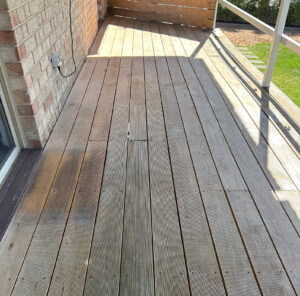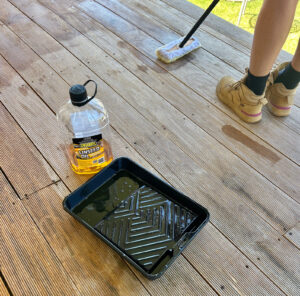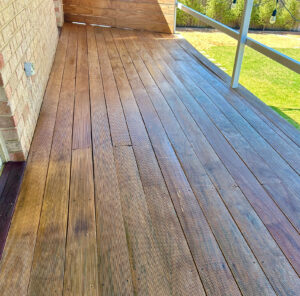By Jess @_prettyliving
Timber decking is a popular flooring choice for outdoor living and entertainment areas around homes across Australia. There’s just something special about enjoying your morning coffee out on the front or back deck, or sitting and relaxing on it after a hard days work. A timber deck can withstand Australia’s climate and last for many years when regularly maintained. Depending on the conditions and exposure to the weather, it is recommended that a deck be re-oiled every 6-12 months.
DIGGERSTM Anti-Mould Linseed Oil makes deck maintenance easy and affordable. It is a ready-to-use product that will seal and protect the timber, is mould, mildew and water resistant and a low cost alternative to other decking oils.
Here are the steps to follow when re-oiling your deck with DIGGERSTM Anti-Mould Linseed Oil:
1. Remove all furniture and all other items from the deck
Before re-oiling, clear the deck completely. Remove furniture, planters, rugs, and grills to ensure full access to the timber and avoid uneven oil application or staining.
2. Thoroughly clean your deck with soapy water and a brush or a pressure washer
Begin by scrubbing down your deck with a stiff brush and mild soapy water to remove dirt, mildew and old oil residue. For tougher grime, use a pressure washer on a low setting to avoid damaging the wood. Note: when using a pressure washer for cleaning, set to a low PSI to avoid damaging the timber.
3. After cleaning, allow the deck to dry
Patience is key, ensure your deck is 100% dry after cleaning. Moisture trapped under the oil causes peeling and uneven absorption.
4. Apply anti-mould linseed oil evenly across the deck
Pour the DIGGERSTM Anti-Mould Linseed Oil into a paint tray, then use a deck brush, applicator pad, or roller for smooth application. Evenly apply onto the entire surface of the deck.
5. Remove excess oil with a lint-free cloth to prevent sticky residue
After applying your anti-mould linseed oil, immediately wipe away any pooled or excess oil using a clean, lint-free cloth. This prevents sticky patches and ensures even drying
6. Allow to dry completely, then apply a second coat
Once your first coat dries, apply a second thinner coat using the same technique. This builds durable protection without creating a sticky surface.
Important Safety Step: Soak all rags in water to prevent spontaneous combustion
After finishing, immediately submerge all oil-soaked cloths and rags in a water. Linseed oil generates heat as it dries, creating dangerous fire risk.
Life-saving tip: Never toss used rags directly in trash, even dry ones can ignite hours later.
It’s important to repeat this maintenance routine every 6-12 months to extend the lifetime of your deck. A simple way to check if your deck is due to be re-oiled is by observing its colour or testing its resistance to water. If your deck is faded/the timber has turned grey or it is soaking up water instead of beading it, then it is time to get yourself some DIGGERSTM Anti-Mould Linseed Oil and re-oil your deck.
Available at Bunnings, MITRE10 and all leading hardware stores.




